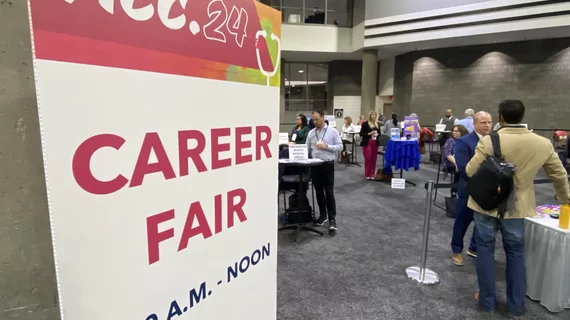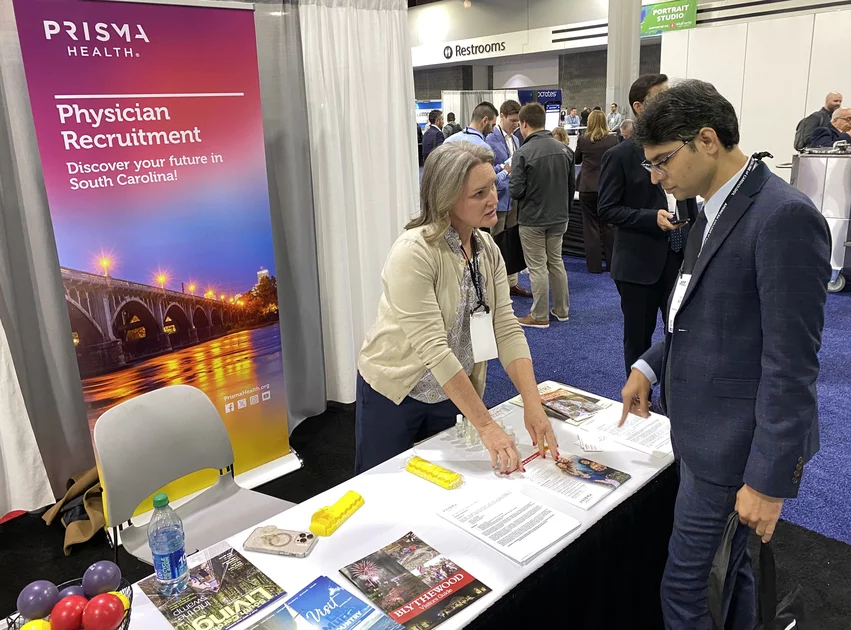The growing shortage or general cardiologists and recruiting crisis in rural America
Since the COVID pandemic, all areas of medicine have experienced a large amount of clinician burnout and re-evaluation of life leading to healthcare's part in the Great Resignation, with some leaving clinical work, going into industry or early retirement. Some experts have predicted a shortage of cardiologists, similar to the major shortage of radiologists that is now occurring.
At the American College of Cardiology (ACC) 2024 meeting, Cardiovascular Business spoke with numerous healthcare system recruiters on the expo floor and set up at the ACC career fair to get their take. Every one of them report there is a rapidly growing shortage in general cardiologists, but they do not have as much trouble filling subspecialty positions such as interventional cardiology.
Many recruiters said they are bracing for growing shortage of all types of cardiologists in the coming years, since more than two-thirds of the current workforce is now over 50. The demand for cardiologists and other physicians is also rapidly growing as baby boomers get older and need more care.
Numerous recruiters at ACC said there has been a movement in the past decade or so where most cardiologists go on to fellowships to specialize and fewer doctors want to be general cardiologists.
"I can open an interventional cardiologist position and I will have 20 applicants, but I can't find general cardiologists. It is also not easy to recruit for small towns," said Dara Brennan, senior physician recruiter for CommonSpirit Health, which has locations in 23 states. In California, they have multiple open general cardiologist positions they cannot fill. She listed the names of towns in rural areas of the state where they have a hard time not only recruiting cardiologists but many other types of doctors. CommonSpirit is facing major shortages for primary care, gastrointestinal specialists and neurologists. "In many areas we serve, neurology is a desert," she explained.
Competition to fill these positions has led to sign-on bonuses in the tens of thousands of dollars in many healthcare systems, and often salaries that are much higher than what was offered just a few years ago before the pandemic. But the bonuses also have led to doctors being hired out from under her, or applicants staying at their current jobs and using the job offer as leverage for more pay.
"It has been a few odd years. Just a couple of years ago I was able to recruit easily, and now we are going to have to pay more," explained Raj Kattar, MD, FACC, president of Promedica Heart Institute, based in Toledo, Ohio. He said higher pay and bonuses are also needed to help retain cardiologists.
Three most important factors in hospital real estate: Location, location, location
Healthcare systems that serve rural areas in the United States report it is already getting harder to recruit doctors of all types to hospitals or clinics located a distance away from major metropolitan areas. This gets compounded if they are not located near oceans, mountains or warmer climates that most people prefer.
One example is Asprius Heart Care based in Wausau, Wisconsin, serving rural areas in mostly remote areas of northern Wisconsin and the upper Michigan peninsula. They have had nine general cardiologist positions open since 2020. Even if a position is filled, another reopens quickly as cardiologists leave to take roles at bigger health systems or in larger cities.
"Location is huge," explained German Larrain, MD, FACC, medical director of Aspirus Heart and Vascular. "We cannot compete with the big cities with their access culture. It is a true crisis. We are adjusting schedules now to allow cardiologists to work from home more, or to pick the locations they want to office out of."
They also started offering fellowship stipends, recruiting bonuses and higher salaries to attract and retain people. The biggest reasons doctors do not want to take jobs with them are because of the severe cold and snow during the winters and the remote areas served, often with long stretches of wilderness between towns. The northern tip of Michigan's upper peninsula jutting out into Lake Superior is in their service area and it can get up to 20-30 feet of snow over a winter season.
However, even warmer climates face issues in attracting cardiologists.
"Location is very important and we face a big barrier in getting them to come to Alabama," explained Kiara Harris, a communication specialist with the Department of Medicine at the University of Alabama at Birmingham. She said many people view the southern state as too backward and rural.
Harris said this view has been amplified recently with the Alabama Supreme Court issuing a ruling in February declaring that embryos created through in vitro fertilization (IVF) should be considered children. She believes this has far reaching implications on healthcare decisions and reproductive rights in the state. She said the University of Alabama has a growing cardio-obstetrics program, but there is now a lot of concern over the state's stand on IVF and ablation laws. These political policies are making many medical students think twice about getting education and training where legislation is hostile to doctors making clinical decisions for their patients, Harris said.
"We also have very aggressive private practices in the state, and as an academic center, we can't compete with salaries or million dollar sign-on bonuses," explained Sam Boadu Jr., MPH, CHFP, administration and fiscal affairs for Cardiovascular Disease at UAB Medicine.
General cardiologists and complex and high-risk coronary intervention (CHIP) interventional cardiologists are hard to find and attract to North Central Heart in Sioux Falls, North Dakota, explained CEO Tom Babb, PharmD, MBA. They have a strong cardiology program, but as some of their long-time cardiologists retire, he is finding it hard to find new recruits to fill their shoes. Part of this boils down to the remote location of their practice and the harsh Great Plains winters. The physicians are also asked to be involved in outreach efforts in the very remote areas in a 200-mile radius around Sioux Falls, which many cardiologists they spoke to are not interested in doing.
His center is considering working with foreign doctors who want to come to the U.S. by helping them get their J1 visa and meet any certification requirements to practice here. Several other recruits mentioned growing interest in this option as a way to help fill general cardiology positions.
But being a physician in a rural community can also have its perks for doctors that want to make a real impact on their community, said Thandi Zeelie, a senior physician recruiter for CommonSpirit Health in Arizona.
"Because you are serving a rural community you really are helping more people directly, and that is something that is important to many doctors," Zeelie said.


